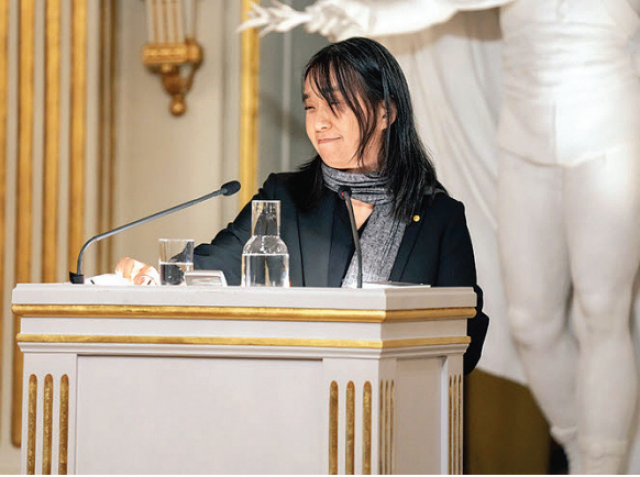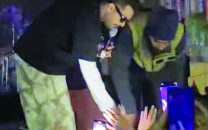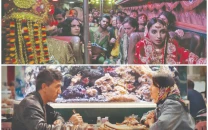Hang Kang's drive to write
Nobel laureate says violence, love inspired literary journey

Alongside the laureates for the Nobel Prize in Physics, Chemistry, Physiology or Medicine and Economic Sciences, South Korean author Han Kang received her award at a ceremony held at the Stockholm Concert Hall in Sweden, on December 10 - the anniversary of Alfred Nobel's death, reported DW.
She delivered her Nobel Prize lecture ahead of the ceremony, on December 7. In a lecture titled 'Light and Thread', she revisits the impulses that have guided her literary journey. Going back to a poem book she wrote at the age of eight, she sees a strong continuity between her early passion for words and her present work: "Where is love? It is inside my thump-thumping beating chest. What is love? It is the gold thread connecting between our hearts," her poem reads.
She then goes on to point out that throughout her work, which includes The Vegetarian or Human Acts, she explores the question of why humans are so violent, and what it means "to belong to the species called human."
"Why is the world so violent and painful? And yet how can the world be this beautiful?" are two questions at the core of her writing, she says.
It is Han Kang's powerful exploration of those questions that led the Swedish Academy to recognise her with the world's top award in literature, noting her "intense poetic prose that confronts historical traumas and exposes the fragility of human life."
From poems to prose
The 53-year-old Han Kang hails from a literary background, with her father already a well-regarded novelist. Han Kang began her career in 1993 with the publication of a number of poems in the South Korean magazine Literature and Society, while her prose debut came in 1995 with the short story collection Love of Yeosu.
The author later began writing longer prose works and had her major international breakthrough with The Vegetarian First published in Korean in 2007, the novel was translated into English in 2015, winning the Man Booker International Prize a year later.
It tells the story of Yeong-hye, a homemaker who, one day, decides to stop eating meat after having a series of dreams with images of animal slaughter. Her decision not to eat meat is met with diverse reactions; it eventually distances her from her family and society, and ultimately sees her descending into a psychosis-like condition.
Human Acts (2014) tells the stories of the survivors and victims of the 1980 Gwangju Uprising in South Korea. Having grown up in Gwangju herself, Han Kang's book captured the event where hundreds of students and unarmed civilians were murdered during a massacre carried out by the South Korean military.
The Swedish Academy stated: "In seeking to give voice to the victims of history, the book confronts this episode with brutal actualisation and, in so doing, approaches the genre of witness literature." Some critics have described it as Han's best novel. It won Korea's Manhae Prize for Literature in 2014 and Italy's Malaparte Prize in 2017.
In The White Book (2016) the story's unnamed narrator moves to a European city where she is haunted by the story of her older sister, who died a mere two hours after birth. This book about mourning, rebirth and the tenacity of the human spirit was shortlisted for the Man Booker International Prize in 2018.
In their citation, the Swedish Academy lauded Han's work for her "unique awareness of the connections between body and soul, the living and the dead." Through her "poetic and experimental style," the academy said, Han "has become an innovator in contemporary prose."



















COMMENTS
Comments are moderated and generally will be posted if they are on-topic and not abusive.
For more information, please see our Comments FAQ